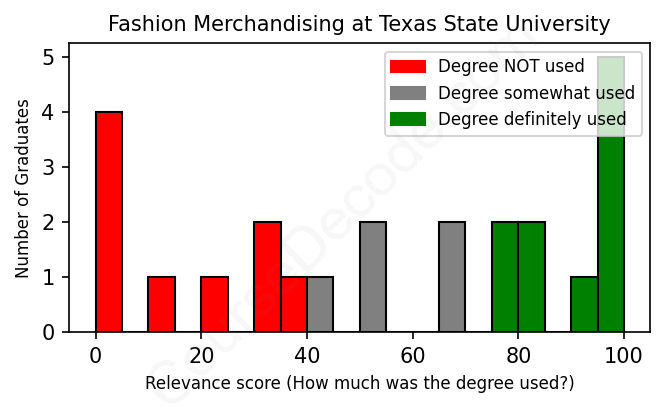
First, some facts. Of the Fashion Merchandising graduates from Texas State University we've analyzed , here's how many have used (or NOT used) their degree in their career:

These are estimates based on AI analysis of 24 LinkedIn profiles (see below).
The verdict? Significantly below average. Overall, with an average relevance score of 54%, Fashion Merchandising graduates from Texas State University have a much lower likelihood (-13%) of finding work in this field compared to the average graduate across all fields:
And for comparison, here's the chart for all profiles we've looked at across all degrees.
Also, after graduating, only 8% of these graduates have pursued further education other than another Bachelor's degree (such as a Masters degree or other), compared to the average across all profiles of 35%. This suggests a Bachelors degree is enough for most Fashion Merchandising graduates, and it's normal to look for work straight after graduation.
See the details:
|
Relevance score: 14% We think this person has NOT gone into a career related to their degree. We think this person has NOT gone into a career related to their degree.
DEGREE INFOGraduated in 2015 from Texas State University with a Bachelor of Applied Science (BASc) in Fashion Merchandising. No other secondary education since. JOB HISTORY SINCE GRADUATIONAccount Manager Lone Star Media LLC Apr 2017 - Mar 2018 Operations Manager  DICK'S Sporting Goods Mar 2018 - Jan 2020 Store Manager  DICK'S Sporting Goods Feb 2020 - Oct 2021 Store Manager  DICK'S Sporting Goods Oct 2021 - May 2022 Store Leader  Altar'd State Jul 2022 - Feb 2024 Market Leader  The Peach Truck Feb 2024 - Present ABOUTSelf-motivated retail professional with over a decade of history in achieving sales targets and managing operational challenges. Solid team builder devoted to empowering employees and working collaboratively to meet objectives. |
The top 10 most common jobs done by the graduates we've analyzed (ranked most common to least) are:
When looking at the jobs held by Texas State University graduates with a degree in Fashion Merchandising, there are some interesting trends. Many have landed in roles like Apparel Buyers or Store Managers, which definitely fit the bill for using skills learned during their studies. Positions like Senior Apparel Buyer and Store Manager at places like Dillard's and Kohl's display a clear connection to fashion merchandising, as they focus on inventory management, consumer trends, and product placement—key areas in the field. However, there are quite a few graduates who veered off into unrelated careers, like Marketing Directors in insurance or Financial Managers, which don't pull from their fashion expertise at all.
Overall, while some graduates are thriving in roles that align neatly with their training, others seem to be using their degree as a springboard into entirely different careers. This mix suggests that having a Fashion Merchandising degree can open doors but doesn't guarantee that every job will stick closely to the industry. It’s a bit of a mixed bag, showing that while some are making an impact in fashion-related positions, many are exploring diverse paths that don't leverage their specific knowledge in fashion merchandising.
Here is a visual representation of the most common words in job titles for Fashion Merchandising graduates (this is across all Fashion Merchandising graduates we've analyzed, not just those who went to Texas State University):

Graduates from Texas State University with a degree in Fashion Merchandising seem to follow a variety of career paths, particularly in retail and related industries. Right after graduation, many of them often land roles like buyers, store managers, or even dive into internships that relate directly to fashion and retail. For instance, graduates from the earlier classes frequently held positions as apparel buyers, marketing directors, and store managers. This indicates a solid entry-level trend toward roles that keep them close to the merchandising and retail aspects of the fashion industry, suggesting they’re utilizing their education straight away.
Five to ten years down the line, many of these graduates have managed to climb the ladder in their respective fields. Positions such as Senior Apparel Buyer, Operations Manager, and even owning their own businesses show a progression towards more leadership and specialized roles. However, it’s worth noting that not every graduate sticks closely to fashion merchandising; some venture into unrelated fields like education or optometry. Overall, while a significant number appear to be thriving within fashion merchandising and retail roles, there are also cases where graduates have branched out into other industries, which may not reflect a failure but rather a broadening of career perspectives. So, for anyone considering this path, it’s clear there are good opportunities available, but there’s also room for diverse experiences along the way!
Honestly, pursuing a Bachelor’s degree in Fashion Merchandising can be a bit of a mixed bag when it comes to difficulty, but it’s generally considered easier than some other majors out there. You’ll definitely have to put in some effort with classes focused on marketing, textiles, and product development, but there's also a lot of creativity involved—like trend forecasting and styling—which can make it feel more fun than grueling. The workload can vary depending on your professors and the projects assigned, but if you’re passionate about fashion and willing to put in the time for assignments and presentations, you’ll likely find it manageable. Just stay organized and keep up with your readings, and you should be good to go!
Most commonly, in the LinkedIn profiles we've looked at, it takes people 3 years to finish a Bachelor degree in Fashion Merchandising.
So, looking at these Fashion Merchandising grads from Texas State University, it seems like a mixed bag when it comes to making decent money. The earlier graduates, especially those working in roles like Marketing Director or Senior Apparel Buyer, are likely pulling in respectable salaries, probably in the range of mid-to-high five figures and possibly six figures if they're in leadership positions. Meanwhile, some of the more recent grads seem to be starting out in roles like customer service or intern positions, which might not pay as well initially. However, there are opportunities for growth, like the recent grad who's already at Burberry or styling for Levi Strauss. Overall, it looks like those with a bit more experience are making decent money, while newer graduates are still climbing the ladder.
Here is a visual representation of the most common words seen in the "about" section of LinkedIn profiles who have a Bachelor degree in Fashion Merchandising (this is across all Fashion Merchandising graduates we've analyzed, not just those who went to Texas State University). This may or may not be useful:

Here are all colleges offering a Bachelor degree in Fashion Merchandising (ordered by the average relevance score of their Fashion Merchandising graduates, best to worst) where we have analyzed at least 10 of their graduates:
| College | Score | Count |
|---|---|---|
 LIM College LIM College
|
70 | 43 |
 University of North Texas University of North Texas
|
69 | 20 |
 Kent State University Kent State University
|
68 | 49 |
 Fashion Institute of Technology Fashion Institute of Technology
|
66 | 21 |
 Philadelphia University Philadelphia University
|
62 | 14 |
 The University of Georgia The University of Georgia
|
59 | 13 |
 California State University-Long Beach California State University-Long Beach
|
56 | 12 |
 Texas State University Texas State University
|
54 | 24 |
 Marist College Marist College
|
54 | 17 |